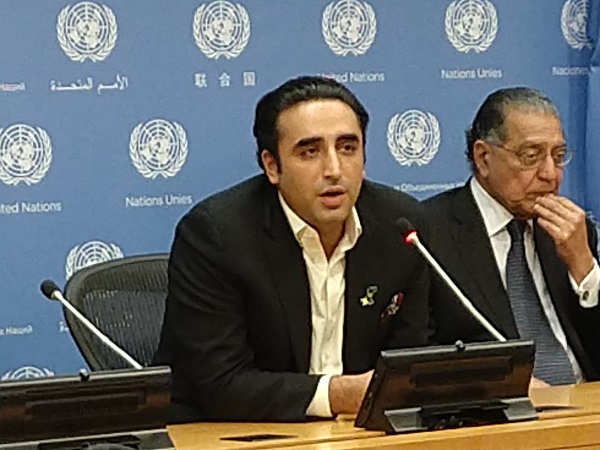United Nations, (Asian independent) Pakistan’s Foreign Minister Bilawal Bhutto Zardari has accused the previous government of Imran Khan of not fully fighting terrorism by ignoring the national action plan to counter it.
“Unfortunately, despite having this plan being on consensus, it hasn’t been owned and implemented in the way it should have been by the previous government,” he said at a news conference here on Thursday.
The government of Prime Minister Shehbaz Sharif, he asserted, will fight terrorism.
He said he was “certainly emphasising that the new government, which I am a part of, that we fully own the National Action Plan and will implement it.”
He ruled out the possibility of a diplomatic breakthrough with India because of the developments in Kashmir.
He cited the abrogation of the special constitutional status of Kashmir in 2019 and the redrawing of electoral constituencies there this year as barriers to improving relations between the two countries.
“Having said that, we are now very cognisant of the fact that economic activity, dialogue, diplomacy are ultimately ways and means for countries to engage with each other and resolve disputes,” he said, adding that it was not possible “particularly at the moment given the hostile behaviour”.
Earlier, at the Security Council, Bilawal followed the Imran Khan administration’s strategy of talking about Kashmir regardless of the topic.
Taking a detour from the debate’s topic of Conflict and Food Security, Bilawal raised the delimitation of electoral constituencies in Kashmir, calling it “an assault on the United Nations, the Security Council and its resolutions”.
While India’s farmers produce more than enough to feed their nation and send surpluses to countries in need and Pakistan’s farmers can’t grow enough food for their country, he made an odd claim about the agriculturists of the two countries.
“We challenge those that worry about food security: Resolve the Kashmir dispute, open the door to peace in South Asia and watch how the farmers of Pakistan and India can feed the world,” he said.
An importer of foodgrains, Pakistan is reportedly now trying to buy discounted wheat from Russia.
An Italian reporter made a false claim at his news conference that India had stopped wheat exports and asked him for his reaction.
India has only stopped future commercial exports while offering to send foodgrains to its neighbours and other countries in dire need – and this was unambiguously stated by India’s Minister of State for External Affairs V. Muraleedharan a little over an hour earlier at the Security Council before Bilawal spoke.
Bilawal said, “India’s decision to ban the export of wheat is the decision of the Indian government to decide what it wishes to do”.
“Such actions, restrictions, actions, protective actions are being discouraged through forums like the multilateral meeting that we held today”, he added.
On relations with the US, which had turned choppy under Imran Khan, Bilawal said, “There’s definitely a new newfound opportunity to enhance engagement to move beyond the trenches as transactionally to a more deep and meaningful relationship.”
He said that rather than aid, Pakistan wants trade and investment from the US.
On what the growing ties between India and the US mean for Pakistan, he said, “Pakistan is not insecure about our relationship with the United States and we believe that the world is big enough for both Pakistan and India to exist”.
“Regardless of the trajectory of the US-India relations, I believe that there is a lot of potential for Pakistan-US relations, and it is to the benefit of the people of Pakistan and the people of America,” he added.
Asked about the role of the army in Pakistani politics, he pointed to the peaceful transfer of power from Imran Khan to Shehbaz Sharif.
“This is the first time in Pakistani history that any government or any party or group of bodies, got off the opposition benches and moved to the Treasury benches”, he said.
He compared Imran Khan’s attempts to stay in power and former US President Donald Trump’s attempts to nullify the election’s outcome in 2020, although he did not name them.
He asserted that there was a parallel between “the methods used by the former prime minister” and “the methods used by the former president of this country”.
“America has a 200-year-old (history) but they too are finding it hard for democracy to cope with ‘post-fact’ politics”, while he said his country was a much younger democracy.
He said the army should not be viewed as his party’s “nemesis” as it is “Pakistan’s army and not the army of any one political party”.








